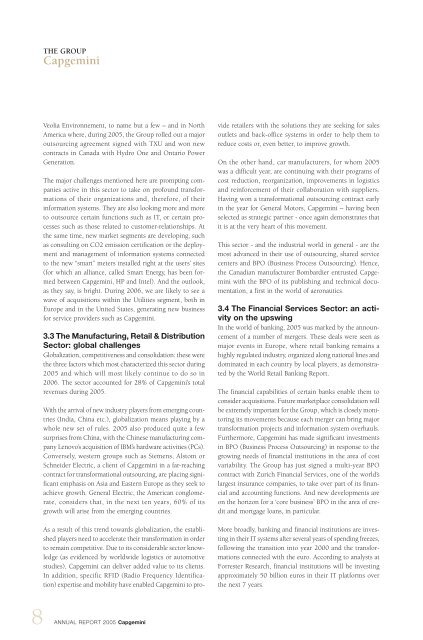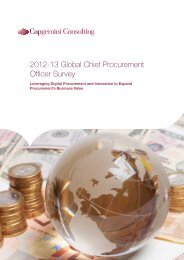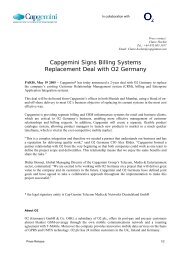You also want an ePaper? Increase the reach of your titles
YUMPU automatically turns print PDFs into web optimized ePapers that Google loves.
8 ANNUAL<br />
THE GROUP<br />
<strong>Capgemini</strong><br />
Veolia Environnement, to name but a few – and in North<br />
America where, during <strong>2005</strong>, the Group rolled out a major<br />
outsourcing agreement signed with TXU and won new<br />
contracts in Canada with Hydro One and Ontario Power<br />
Generation.<br />
The major challenges mentioned here are prompting companies<br />
active in this sector to take on profound transformations<br />
of their organizations and, therefore, of their<br />
information systems. They are also looking more and more<br />
to outsource certain functions such as IT, or certain processes<br />
such as those related to customer-relationships. At<br />
the same time, new market segments are developing, such<br />
as consulting on CO2 emission certification or the deployment<br />
and management of information systems connected<br />
to the new “smart” meters installed right at the users’ sites<br />
(for which an alliance, called Smart Energy, has been formed<br />
between <strong>Capgemini</strong>, HP and Intel). And the outlook,<br />
as they say, is bright. During 2006, we are likely to see a<br />
wave of acquisitions within the Utilities segment, both in<br />
Europe and in the United States, generating new business<br />
for service providers such as <strong>Capgemini</strong>.<br />
3.3 The Manufacturing, Retail & Distribution<br />
Sector: global challenges<br />
Globalization, competitiveness and consolidation: these were<br />
the three factors which most characterized this sector during<br />
<strong>2005</strong> and which will most likely continue to do so in<br />
2006. The sector accounted for 28% of <strong>Capgemini</strong>’s total<br />
revenues during <strong>2005</strong>.<br />
With the arrival of new industry players from emerging countries<br />
(India, China etc.), globalization means playing by a<br />
whole new set of rules. <strong>2005</strong> also produced quite a few<br />
surprises from China, with the Chinese manufacturing company<br />
Lenovo’s acquisition of IBM’s hardware activities (PCs).<br />
Conversely, western groups such as Siemens, Alstom or<br />
Schneider Electric, a client of <strong>Capgemini</strong> in a far-reaching<br />
contract for transformational outsourcing, are placing significant<br />
emphasis on Asia and Eastern Europe as they seek to<br />
achieve growth. General Electric, the American conglomerate,<br />
considers that, in the next ten years, 60% of its<br />
growth will arise from the emerging countries.<br />
As a result of this trend towards globalization, the established<br />
players need to accelerate their transformation in order<br />
to remain competitive. Due to its considerable sector knowledge<br />
(as evidenced by worldwide logistics or automotive<br />
studies), <strong>Capgemini</strong> can deliver added value to its clients.<br />
In addition, specific RFID (Radio Frequency Identification)<br />
expertise and mobility have enabled <strong>Capgemini</strong> to pro-<br />
REPORT <strong>2005</strong> <strong>Capgemini</strong><br />
vide retailers with the solutions they are seeking for sales<br />
outlets and back-office systems in order to help them to<br />
reduce costs or, even better, to improve growth.<br />
On the other hand, car manufacturers, for whom <strong>2005</strong><br />
was a difficult year, are continuing with their programs of<br />
cost reduction, reorganization, improvements in logistics<br />
and reinforcement of their collaboration with suppliers.<br />
Having won a transformational outsourcing contract early<br />
in the year for General Motors, <strong>Capgemini</strong> – having been<br />
selected as strategic partner - once again demonstrates that<br />
it is at the very heart of this movement.<br />
This sector - and the industrial world in general - are the<br />
most advanced in their use of outsourcing, shared service<br />
centers and BPO (Business Process Outsourcing). Hence,<br />
the Canadian manufacturer Bombardier entrusted <strong>Capgemini</strong><br />
with the BPO of its publishing and technical documentation,<br />
a first in the world of aeronautics.<br />
3.4 The <strong>Financial</strong> Services Sector: an activity<br />
on the upswing<br />
In the world of banking, <strong>2005</strong> was marked by the announcement<br />
of a number of mergers. These deals were seen as<br />
major events in Europe, where retail banking remains a<br />
highly regulated industry, organized along national lines and<br />
dominated in each country by local players, as demonstrated<br />
by the World Retail Banking <strong>Report</strong>.<br />
The financial capabilities of certain banks enable them to<br />
consider acquisitions. Future marketplace consolidation will<br />
be extremely important for the Group, which is closely monitoring<br />
its movements because each merger can bring major<br />
transformation projects and information system overhauls.<br />
Furthermore, <strong>Capgemini</strong> has made significant investments<br />
in BPO (Business Process Outsourcing) in response to the<br />
growing needs of financial institutions in the area of cost<br />
variability. The Group has just signed a multi-year BPO<br />
contract with Zurich <strong>Financial</strong> Services, one of the world’s<br />
largest insurance companies, to take over part of its financial<br />
and accounting functions. And new developments are<br />
on the horizon for a ‘core business’ BPO in the area of credit<br />
and mortgage loans, in particular.<br />
More broadly, banking and financial institutions are investing<br />
in their IT systems after several years of spending freezes,<br />
following the transition into year 2000 and the transformations<br />
connected with the euro. According to analysts at<br />
Forrester Research, financial institutions will be investing<br />
approximately 50 billion euros in their IT platforms over<br />
the next 7 years.















